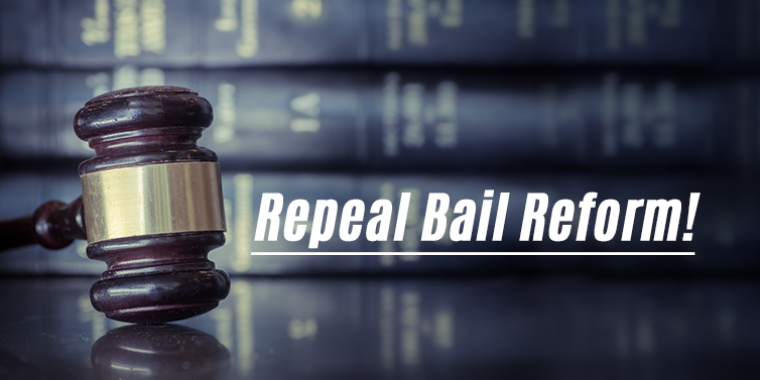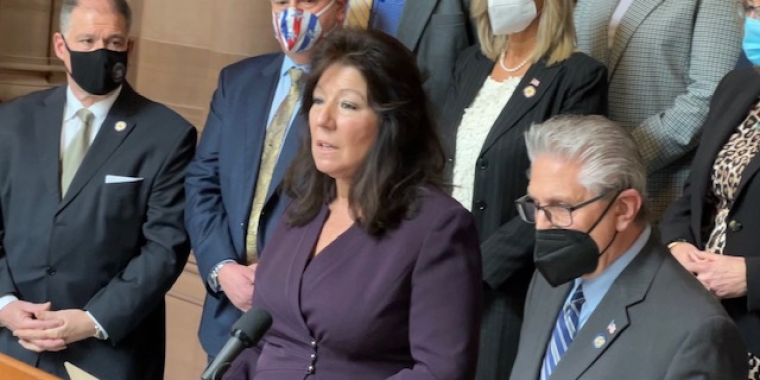
SERINO: FUGITIVES SHOULDN’T GET A FREE PASS
January 16, 2020
-
ISSUE:
- bail reform. public safety

ALBANY, NY— Everyone knows that New York’s new bail measures have tied the hands of judges when it comes to setting bail upon arraignment, but few have noted that the changes also limit their ability to arrest those who fail to reappear for their scheduled hearing.
Senator Sue Serino today is taking aim at a provision of the new law that encourages criminals to evade law enforcement by requiring 48 hours to pass before a warrant can be issued for those who fail to appear for their scheduled hearing. Serino, a prominent leader in the fight against the state’s dangerous new bail measures, today announced the introduction of legislation to repeal the ill-conceived provision and give judges the ability to issue a warrant immediately.
Senator Serino said, “This provision of the new bail measure is just one more slap in the face to the law-abiding citizens of this state. Fugitives should not get a free pass—those who were released on their own recognizance who choose not to return to court should be rearrested immediately. This provision does nothing but give criminals a full two days head start as they continue to evade law enforcement. Not only is it incredibly dangerous, but it will waste already limited resources as law enforcement is forced to play catch-up.”
When the new bail reform measures took effect on January 1, 2020, they severely limited judges’ ability to set bail, only allowing them to do so if they determine that a defendant is a flight risk. A defendant’s criminal history, or the fact that they may pose a clear physical threat to another person, cannot be considered. In addition, the measures included a provision that expressly requires a judge to provide at least 48 hours’ notice to a defendant or their counsel about the need for them to appear in court to give them a chance to do so voluntarily before they can formally issue a bench warrant. Serino’s bill (S. 7269) would reinstate the discretion of judges to issue a bench warrant immediately when a defendant in a criminal proceeding fails to appear for a scheduled court appearance.
The need for this legislation was recently highlighted when the Cortland Voice reported on the case of a Cortland man indicted on 11 felony counts of possessing child pornography who failed to appear for his scheduled court appearance. According to the report, in a signed police statement, the defendant has already pled guilty to one of the counts, and confessed to having at least 80 or 90 images of child pornography on his cell phone, a number that police say is actually closer to 200. After pleading guilty to the count on October 3rd and being released pending his sentencing, the man has since failed to reappear in court twice, first on January 2nd and again on January 9th. The judge in the case issued the bench warrant, but is holding it for 48 hours as required by the new law.
Serino continued saying, “When someone who has already pled guilty to these kinds of heinous crimes fails to appear in court, every second counts. We have a duty to put public safety first and to ensure that our courts and law enforcement have the tools they need to act immediately to take known criminals off our streets. The bills I have introduced on this issue are about protecting our most vulnerable and providing judges with the discretion they need to help keep our communities safe.”
The bill is part of a package introduced by Serino that aim to rectify some of the most egregious portions of the new bail measures. Serino was the first member of the Legislature to introduce a bill (S. 6840) that would expressly allow judges to consider a perpetrators’ dangerousness when determining whether a defendant should be held pre-trial. She has also introduced a bill (S. 6839) aimed at protecting victims of domestic violence who are especially vulnerable under the new law as was highlighted in a recent report by the Albany Times Union.
The bill introduced today has been referred to the Senate’s Codes Committee.
-30-
related legislation
Share this Article or Press Release
Newsroom
Go to Newsroom
SERINO AND TEDISCO PUSH FOR DOH INVESTIGATION OF NURSING HOME DEATHS
February 7, 2022

SERINO & MOLINARO: FIX BAIL ‘REFORM’
January 31, 2022

